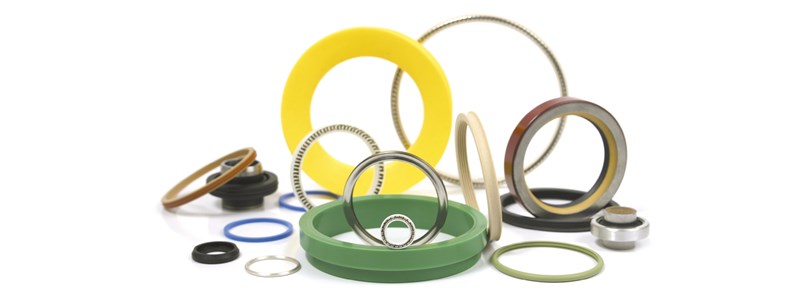Materials for seals
May 2021

PTFE constitutes all the properties that are crucial for a good sealing material due to its high wear resistance, durability, and low coefficient of friction.
Seals allow a mechanical assembly to both function freely whilst also retaining fluid, so a material that is flexible enough to assist with fluid retention and strong enough to withstand the wear load of the mating parts is essential.
Within any assembly, a balance needs to be found between fluid retention and durability and this is where choosing a filled grade of PTFE can be beneficial:
- glass offers stiffness and creep resistance;
- bronze and moly offer wear resistance, but increase the coefficient of friction;
- carbon and graphite offer wear resistance and dimensional stability.
The PV value offers a trade-off between the pressure that the PTFE can take and the speed at which the mating part is sliding against it, this is crucial to understanding whether the PTFE grade would be able to withstand the combination of load and RPM involved.
Along with the surface finish of the seal, the surface finish of the mating part can play a significant role in the suitability of the grade, when the surface is rough it results in wear occurring more quickly.
When the mating part is hardened there is a significant improvement in the life of the seal. Improving the surface hardness of the mating part reduces the exchange of ions which occur when a hard and soft surface are in contact causing adhesion and a reduction in the effectiveness of the seal.
Spring Energised Seals
Adding a spring to the seal will strengthen PTFE, allowing the PTFE to take loads while also creating a tighter fit that ensures no leakage. The spring also helps compensate for wear or gland misalignment.
Types of spring energised seals include:
- O-Ring – For static and dynamic applications
- Rotary lip seals – For rotary elements such as shafts and bores
- Coil spring – For static or slow dynamic applications
- Double coil spring – For static applications
- V spring - For dynamic applications
PEEK has similar attributes to PTFE, however, it has higher tensile strength and hardness so is therefore preferable in applications where dimensional stability is required over prolonged physical strain. PEEK also has a lower specific gravity so is the material of choice where the overall weight of the assembly is a factor.
While most applications call for virgin PEEK, there are requirements where filled grades can be beneficial. Applications, where properties such as creep, dimensional stability, and flexural strength need improvement, can benefit from glass or carbon fillers.
Typical PEEK Seals
- Piston Ring Seals – Used primarily to aid wear absorption on the outer diameter of the piston shaft
- Ball Valve Seats - Used in high-performance valves employed on oil-rigs or power plants, where the high temperatures indicate a requirement for a polymer slightly tougher than PTFE
- Ball and Butterfly Valve Seats – Used in applications with high pressures and temperature
At Fluorocarbon, we offer custom solutions for use throughout many industries including Chemical, Pharmaceutical, Food Processing, Aerospace, Automotive and Off-Shore.
Manufactured for use in the most demanding conditions our seals offer the following benefits:
- Excellent chemical resistance
- Wide operating temperature range
- Very low coefficient of friction
- No stick/slip effect
- High resistance to wear
- Good dry-running properties
Whether a standard seal or a custom requirement, our dedicated technical team can provide you with innovative and effective solutions to your needs. Drop us an email to find out more team@fluorocarbon.co.uk










